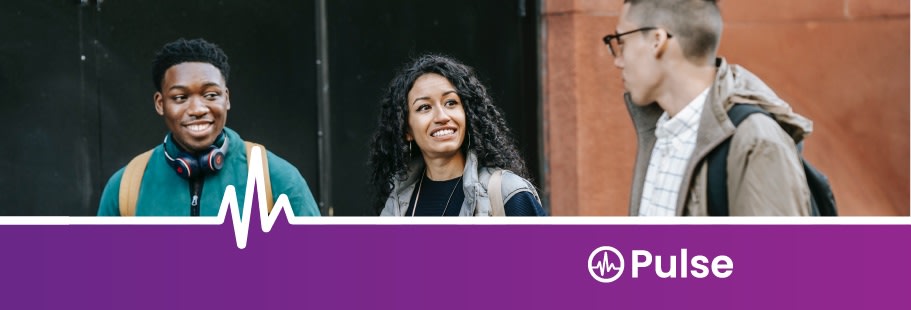
One Year On Meets Omicron – Postgraduate Pulse Update for January 2022
Welcome to the first Pulse update for 2022. I'll apologise for the slight lapse in December – my wife and I were welcoming a second child and you were all hopefully having a holiday (we also had a holiday, just one with lots of nappy changing). My new arrival means that finally having a full 12 months of data on postgraduate study intentions is only the second most exciting thing about the new year, but, on the plus side, the data so far is responsible for fewer sleepless nights than the baby.
A year ago, we launched Pulse amidst a new wave of coronavirus and accompanying restrictions. A year later and... things perhaps aren't quite as different as might have been hoped.
With that in mind, I want to use this update to quickly take stock of what we can learn from the 2021 data, whilst also looking at the possible impact of the omicron variant so far.
Highlights
- The majority of people are now targetting postgraduate study in 2022 (particularly at PhD level)
- The emergence of the omicron variant (and accompanying restrictions) may be causing more UK students to consider an online Masters
- Confidence and study intent is high for international postgraduates, but this audience is also the most concerned about future distruption of their programmes due to Covid-19
Confidence in postgraduate study continues to (loosely) track the pandemic.
The 'benchmark' question for Pulse asks prospective students how confident they are about doing a Masters or PhD right now (using a five-point Likert). This has its limitations (confidence doesn't necessarily imply intention to apply) but it's worked well as a way of tracking attitudes during the pandemic.
Here's the % of people who say they're 'very confident' about PGT (Masters) or PGR (PhD) study, going back to April 2021 (when we added Pulse to FindAPhD.com):
Yes, this is an exceptionally busy chart, with all series plotted by default. I recommend you knock most of them out and focus on specific audiences. When I do that, I note the following:
- UK students' attitudes to postgraduate study more or less follow the pattern of lockdowns and restrictions. There's a fall at the start of 2021, followed by a rise in the summer and another fall followed by a slight recovery in the autumn and winter.
- It's a similar trend for EU students but confidence overall is higher here. The autumn drop also happens around a month earlier.
- What's interesting is that both UK and EU students' confidence in PhD study steadily falls after a summer highpoint, whereas confidence in Masters study improves or stays the same. I wonder if this reflects a wider narrative around PhD study, as current students' dissatisfaction with Covid-19 support is reflected in wider media coverage read by prospective applicants. If so, this is something universities should attempt to address with (honest) case studies of their own.
- Finally, confidence in postgraduate study remains much higher and more consistent for regions such as Africa and South Asia. This continues to reflect robust demand for international Masters and PhD study, regardless of obstacles to feasibility.
The pandemic is making some people less likely to study, and others more concerned about the future
Despite the correlations above, we need to remember that there are other factors (e.g. funding) that might change how confident someone is about doing a Masters or PhD. So, from September, Pulse has included two more specific questions about the impact of Covid-19.
The first asks whether someone is currently more or less likely to study as a direct result of the pandemic. Here's the % of people who answer 'less likely':
For the sake of simplicity, I'm just charting domestic and international students for the UK here.
One thing we see right away is a sharp rise in the proportion of UK saying they're less likely to study a Masters as a result of the pandemic. This is where the omicron impact seems to be. There's a similar rise for UK PhD students, but it isn't sustained. The 'baseline' impact for international students is higher, but it doesn't increase with the new variant.
These are still small %, with the majority of students saying the pandemic hasn't impacted their immediate study intentions. But that doesn't mean they aren't at all worried by Covid-19. Our second question asks how concerned prospective students are about future disruption during a Masters or PhD:
This time I've plotted the % of people who are 'very concerned' about future Covid disruption.
Again, there's a sharp increase in concern for UK students as omicron arrives. We also see just how much more consistently concerned prospective international students are about the future impact of coronavirus on their studies. This doesn't necessarily mean they won't apply (remember, confidence is consistently high for major 'sending' countries), but they may be more receptive to support and reassurance as they do.
Interest is swinging back to September
One of my ambitions for Pulse was to get a better sense of how the postgraduate application looks during a typical year. Setting aside the question of whether such a thing as a 'typical year' exists, we do at least have a year of data to look at now.
The following chart plots interest in different start points for all prospective PGT (Masters) students. The pattern is actually quite similar for PGR, but we don't have a full 12 months of data there (yet).
*January 21 was originally labelled 'asap', which made sense when launching the tracker in January 21, but was less clear as time progressed. Its removal in June explains the slight bulge in interest for September 21 (the next 'asap' option).
It'll be fascinating (for those fascinated by postgraduate recruitment) to see how closely 2022 tracks 2021, but, based on one complete year of data it looks like:
- Interest in the following September peaks in the summer, after which attention turns to entry points for the next calendar year.
- Interest in the following January peaks in the autumn.
The focus right now is very much on September 22, with some residual focus on January 22 (which, as we know, doesn't necessarily mean January) and interest building for 2023.
Omicron may be prompting some students to consider online Masters
You may recall that my last Pulse update was titled Back to Campus in January. Well, here's what happened next:
We're just looking at domestic UK students here, as this audience has a good mix of interest in online, blended and on campus study (something our 2021 Future Student reports recently explored in more depth).
For prospective PGT students, there's a sharp swing from on campus to online study just as 'Plan B' restrictions are introduced. This is only one month of data (and December isn't the one month anyone would pick) but it's a pretty strong correlation.
There isn't a similar shift for PhD, where the vast majority (roughly 80%) of prospective students are still looking for an on campus or blended option. Again, there's more on this (including breakdowns for subject areas) in our second 2021 Future Student report.
Conclusions?
I'd planned to spend this update looking at trends across 2021, but it's the trends at the end of the year that are clearly most important.
Omicron has made prospective postgraduates more hesitant and more concerned – particularly at Masters level – and it may also be increasing interest in online study. That said, overall confidence is still very strong and the focus is very much on September. Here's hoping the news is good between now and then.
You may also like...
Future Masters and Future PhD Surveys – 2021 results]
Read the latest reports from our in-depth postgraduate surveys, drawing on responses from over 16,000 prospective Masters and PhD students.
Engaging prospective postgraduates – approaches across the sector
Maree sums up the highlights and insights offered by a range of experts as part of our final webinar of 2021.


